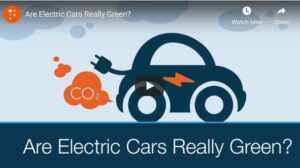

How is that Commodore 64 working out for ya? The pace of technology change is very fast; last years problems are resolved this year and will get much better two years from now. Apparently this is news to many electric vehicle critics who use old data to promote their own anti-EV agenda’s with superficially scientific claims.
A few days ago a “why can’t I buy a V12 pickup truck” friend, sent us this sciencey looking video which claims that electric vehicles are really terrible for the environment. The problem with the slick graphic analysis is that it is just simply inaccurate.
We have seen enough of these types of videos and conversations that we decided to take up the issue and BRIEFLY explain exactly why these criticisms of EV’s are wrong. EV facts are fast moving and they are only going in one way, better. So there is no point in getting hung up on precise numbers.
Those of you who have read PartisanIssues will know that I am not a zealot about EV’s; they have lots of issues but negatively effecting the environmental impacts isn’t one of them. So lets go through the claims one by one.
Notice that the serious decline of coal in the United states started in the late 2000’s and contrary to popular myth accelerated under the former President Trump. This is not because coal was pushed down by regulation but because renewables and natural gas technologies became substantially cheaper than coal.
.
Beyond the analysis above that shows how much better EV’s are, there is more to consider. Built into nearly all of the critisims of EV’s are two assumptions:
Both of these assumptions are fundamentally wrong.
Because EV’s have 30% fewer parts and a wildly simplified powertrain (battery, electric motors and tires) there is very little to brake on them and they will last much longer than traditional internal combustion engine vehicles. We have not had EV’s long enough to make a definitive statement but our best guess is that EV’s will be on the road twice as long as gas powered cars.
When an electric vehicle battery won’t charge to more than about 70% of its capacity due to age the battery is replaced by the manufacturer. However, Ford, GM, Tesla, Mercedes and others are not stupid. They are not going to put those batteries in landfills. Used EV batteries are simply repurposed. They are asset… a valueable asset. EV batteries are so reliable that there have been precious few of them to repurpose but that will change:
“…California is the largest market for EVs in the US and by 2027, an estimated 45,000 EV batteries will be retired from the state. Assuming a conservative capacity for each of these batteries (25 kWh), this amounts to over 1 GWh/year of available storage in the Golden State. … After 8 to 12 years in a vehicle, the lithium batteries used in EVs are likely to retain more than two thirds of their usable energy storage. ” SOURCE
When there is a supply of used EV batteries they will be used for home storage, utility scale electricity storage and datacenter backups. And even when those repurposed uses are exhausted, these large batteries will not fill our dumps, they will be harvested for metals and materials, then built into new batteries.
To put help put a cap on this topic, below is a solid, modern analsys of a real cars showing that in 2020 EV’s are carbon competitive with gas powered vehicles in just two years. By the 10th year of life an gas car will produce 70% more GHG’s than an EV. EV’s should last nearly 20 years on the road and have their batteries repurposed to other GHG saving and convenience making uses.
We can go on and on about other benefits of electric cars like:
The bottom line is that electric vehicles are just a better, cheaper technology which just so happens to be better for the planet too.
This website uses cookies.